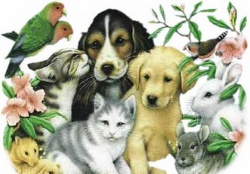Difference between revisions of "Pet"
(Created page with "thumb|250px| A pet (piyasatta) is an animal kept for companionship or pleasure. At the time of the Buddha, people kept parrots, baby monkeys and other ani...") |
|||
| Line 1: | Line 1: | ||
[[File:Pet.jpg|thumb|250px|]] | [[File:Pet.jpg|thumb|250px|]] | ||
| − | A pet (piyasatta) is an animal kept for companionship or pleasure. At the time of the Buddha, people kept parrots, baby monkeys and other animals as pets (J.II,184; III,97). Pets can be either domestic or wild animals. Domestic animals like dogs and cats prefer human company while others, like canaries and guinea pigs, cannot survive without being looked after or protected by humans. Wild animals kept as pets generally have to be kept caged to prevent them from escaping. Domestic animals often give their owners a great deal of comfort and joy and usually receive it in return. Wild animals, on the other hand, almost certainly prefer their natural environment and the company of their own kind. | + | |
| − | Some people keep unusual or dangerous wild animals like large spiders, reptiles or even great apes, not to receive or give affection, but to enhance their ego and make themselves appear more interesting than they really are. It could be argued that keeping wild animals is breaking the third Precept, in that it involves deriving pleasure at the expense of another sentient being. Whatever the case, the desire for wild animals as pets means that the natural environment is stripped of its wildlife, which can only be detrimental to its long-term health and survival. A responsible Buddhist would probably not want to contribute to this problem. | + | |
| + | |||
| + | A [[pet]] ([[piyasatta]]) is an [[animal]] kept for companionship or [[pleasure]]. | ||
| + | |||
| + | At the time of the [[Buddha]], [[people]] kept parrots, baby monkeys and other [[animals]] as [[pets]] (J.II,184; III,97). | ||
| + | |||
| + | Pets can be either domestic or wild [[animals]]. Domestic [[animals]] like [[dogs]] and cats prefer [[human]] company while others, like canaries and guinea pigs, cannot survive without being looked after or protected by [[humans]]. | ||
| + | |||
| + | Wild [[animals]] kept as pets generally have to be kept caged to prevent them from escaping. | ||
| + | |||
| + | Domestic [[animals]] often give their owners a great deal of {{Wiki|comfort}} and [[joy]] and usually receive it in return. Wild [[animals]], on the other hand, almost certainly prefer their natural {{Wiki|environment}} and the company of their [[own]] kind. | ||
| + | |||
| + | |||
| + | Some [[people]] keep unusual or [[dangerous]] wild [[animals]] like large spiders, {{Wiki|reptiles}} or even great apes, not to receive or give {{Wiki|affection}}, but to enhance their [[ego]] and make themselves appear more [[interesting]] than they really are. | ||
| + | |||
| + | It could be argued that keeping wild [[animals]] is breaking the third [[Precept]], in that it involves deriving [[pleasure]] at the expense of another [[sentient being]]. | ||
| + | |||
| + | Whatever the case, the [[desire]] for wild [[animals]] as pets means that the natural {{Wiki|environment}} is stripped of its wildlife, which can only be detrimental to its long-term [[health]] and survival. | ||
| + | |||
| + | A responsible [[Buddhist]] would probably not want to contribute to this problem. | ||
{{R}} | {{R}} | ||
[http://www.buddhisma2z.com/content.php?id=309 www.buddhisma2z.com] | [http://www.buddhisma2z.com/content.php?id=309 www.buddhisma2z.com] | ||
[[Category:Buddhist Terms]] | [[Category:Buddhist Terms]] | ||
Latest revision as of 05:00, 8 January 2016
A pet (piyasatta) is an animal kept for companionship or pleasure.
At the time of the Buddha, people kept parrots, baby monkeys and other animals as pets (J.II,184; III,97).
Pets can be either domestic or wild animals. Domestic animals like dogs and cats prefer human company while others, like canaries and guinea pigs, cannot survive without being looked after or protected by humans.
Wild animals kept as pets generally have to be kept caged to prevent them from escaping.
Domestic animals often give their owners a great deal of comfort and joy and usually receive it in return. Wild animals, on the other hand, almost certainly prefer their natural environment and the company of their own kind.
Some people keep unusual or dangerous wild animals like large spiders, reptiles or even great apes, not to receive or give affection, but to enhance their ego and make themselves appear more interesting than they really are.
It could be argued that keeping wild animals is breaking the third Precept, in that it involves deriving pleasure at the expense of another sentient being.
Whatever the case, the desire for wild animals as pets means that the natural environment is stripped of its wildlife, which can only be detrimental to its long-term health and survival.
A responsible Buddhist would probably not want to contribute to this problem.
